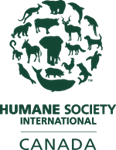‘Free Willy’ Bill heads to final hour of debate, set to pass Parliament
S-203, the ‘Ending the Captivity of Whales and Dolphins Act’, would end cruel confinement of cetaceans
OTTAWA, June 10, 2019 (GLOBE NEWSWIRE) -- Bill S-203, the Ending the Captivity of Whales and Dolphins Act, will move to the last hour of debate at 3rd Reading and is expected to reach a final vote in the House of Commons this morning. Bill S-203 prohibits the wild capture, captivity, and breeding of whales, dolphins, and porpoises, and restricts trade in these animals as well.
Representatives from Humane Society International/Canada and sponsors of the Bill will be available for comment at a press conference following the vote and will then be available for interviews and a photo opportunity outside on Parliament Hill.
What: 3rd and final reading, Bill S-203 – Ending the Captivity of Whales and Dolphins Act
When: Monday, June 10
- 11:00am – 11:45am, 3rd and final reading, House of Commons
- 12:30pm – 12:45pm: 135-B Press Conference Room, West Block, 111 Wellington
- 1:00pm – 2pm: photo op with signs in front of Centre Block
Who:
- Rebecca Aldworth, Executive Director, Humane Society International/Canada
- MP Elizabeth May, leader of the Green Party and House of Commons sponsor of Bill S-203
- Retired Liberal Senator Wilfred Moore, original Senate sponsor of Bill S-203
- NDP MP Gord Johns
- Bloc MP Monique Pauzé
- Representatives from HSI/Canada will be available for comment throughout the day.
Facts:
- Bill S-203 phases out the captivity of cetaceans (i.e. whales, dolphins and porpoises) in Canada, except for rescues, rehabilitation, licensed scientific research, or cetaceans’ best interests.
- HSI/Canada has campaigned to end the captivity of cetaceans for years. Globally, HSI has been at the forefront of a powerful movement to protect cetaceans and end their cruel captivity through education, outreach, and legislative efforts.
- Leading marine scientists agree that whales and dolphins suffer great psychological and physical harms in captivity, including isolation, chronic health problems, abnormal behaviour, high infant mortality and extreme boredom.
- Currently, only two facilities in the country house cetaceans – the Vancouver Aquarium, and Marineland in Niagara Falls. Now, these facilities could no longer be able to breed or import any new cetaceans into their facilities.
Media Contact: Christopher Paré, Director of Communications – o: 514-395-2914 x 206, c: 438-402-0643, email: cpare@hsi.org
Humane Society International/Canada is a leading force for animal protection, with active programs in companion animals, wildlife and habitat protection, marine mammal preservation, farm animal welfare and animals in research. HSI/Canada is proud to be a part of Humane Society International which, together with its partners, constitutes one of the world's largest animal protection organizations. Celebrating animals and confronting cruelty worldwide - on the Web at www.hsicanada.ca


